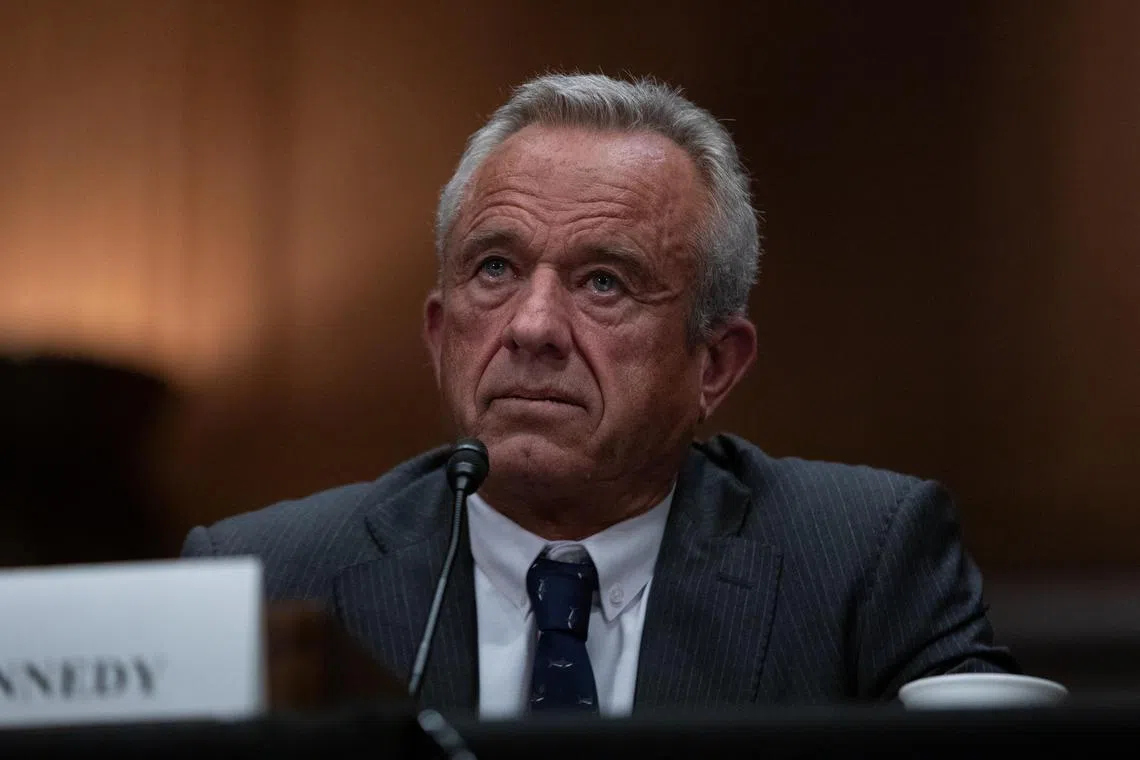Democratic Senators demand health pick Kennedy’s recusal from vaccine matters if confirmed
Sign up now: Get ST's newsletters delivered to your inbox

Mr Kennedy has faced scrutiny during his nomination over his ties to law firm Wisner Baum, which specialises in pharmaceutical drug injury cases.
PHOTO: EPA-EFE
Follow topic:
NEW YORK - Two US senators who will vote this week on whether to advance Mr Robert F. Kennedy Jr’s nomination as the top US health official
Senator Ron Wyden, the top Democrat on the Senate Finance Committee, and Democratic Senator Elizabeth Warren also asked that Mr Kennedy, who is Republican President Trump’s choice to lead the Department of Health and Human Services (HHS), pledge not to engage in lawsuits involving vaccines for at least four years after leaving office.
Mr Kennedy, a 70-year-old environmental activist who has spread misinformation on vaccines, was questioned last week by both Republican and Democratic senators on the Senate’s Finance and Health committees.
The Finance Committee will vote this week on whether to push Mr Kennedy’s nomination to a full Senate vote.
Groups that oppose Mr Kennedy’s confirmation see a handful of Republican senators as potential swing votes against Mr Kennedy, including Senator Bill Cassidy and Senator Mitch McConnell.
If confirmed, Mr Kennedy would run HHS, which oversees more than US$3 trillion (S$4.1 trillion) in healthcare spending, including at the Food and Drug Administration and the agency in charge of the Medicare and Medicaid health insurance programmes covering nearly half of all Americans.
Mr Kennedy has faced scrutiny during his nomination over his ties to Los Angeles-based law firm Wisner Baum, which specialises in pharmaceutical drug injury cases.
He has an arrangement to earn 10 per cent of fees awarded in contingency cases he refers to the firm, according to a letter Mr Kennedy wrote to an HHS ethics official released in January.
In that letter, Mr Kennedy wrote that if confirmed, he would retain that financial interest in cases that do not directly impact the US government.
After his confirmation hearings last week, Mr Kennedy sent a supplemental letter, dated Feb 1, to HHS, writing that he will assign his right to receive payment from cases not directly impacting the US government to a non-dependent, adult family member.
He excluded payment from claims against Southern California Edison, Boeing and Pacific Gas and Electric Corporation for damages resulting from previous California wildfires.
“The arrangement outlined in your Ethics Agreement Amendment is plainly inadequate, as it would appear to allow an immediate family member to benefit financially from your position as Secretary,” Mr Wyden and Ms Warren wrote in their letter to Mr Kennedy.
“It seems possible that many different types of vaccine-related decisions and communications – which you would be empowered to make and influence as Secretary – could result in significant financial compensation for your family,” they wrote.
Mr Wyden and Ms Warren added that they do no trust Mr Kennedy’s disclosures to the Finance Committee, as they said Mr Kennedy has failed to disclose the “hundreds of cases” he has referred to Wisner Baum to which the 10 per cent referral fee agreement applies and has failed to provide clarity about which vaccines were involved in those cases.
“During the course of my work with Wisner Baum, I referred many hundreds of cases to the firm,” Mr Kennedy wrote in response to questions from the Finance Committee after his confirmation hearing. “It is impossible to provide the information requested, much of which I do not personally have, with respect to each such case in the time allotted for my response.”
Reuters exclusively reported in January that Mr Kennedy played an instrumental role in organising mass litigation against Merck over its human papillomavirus shot Gardasil.
In his additional responses to the Finance Committee, Mr Kennedy wrote he would not commit to recuse himself from various HHS matters related to the Gardasil vaccine, including public statements related to Gardasil.
Mr Kennedy, who founded the anti-vaccine group Children’s Health Defence, argues that he is not against vaccines. The group has sued in state and federal courts over vaccines.
Senator Cassidy, a key Republican senator on the Finance Committee, told Mr Kennedy last week that he was struggling with the nomination, saying he had reservations about Mr Kennedy’s “misleading arguments” on vaccines.
If Mr Kennedy’s nomination goes to the full Senate, he would need the support of at least 50 senators, which would allow Vice-President J.D. Vance to cast another tie-breaking vote to confirm his nomination. REUTERS

